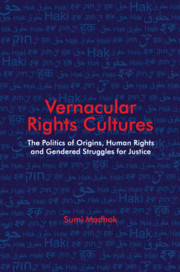 Vernacular Rights Cultures
Vernacular Rights Cultures Book contents
- Frontmatter
- Dedication
- Contents
- Acknowledgements
- 1 An Introduction: Vernacular Rights Cultures and Decolonising Human Rights
- 2 Refusing the Politics of Origins
- 3 Assembling a Feminist Historical Ontology of Haq
- 4 The Political Imaginaries of Haq: ‘Citizenship’ and ‘Truth’
- 5 Resisting Developmentalism and the Military: Haq as a Cosmological Idea and an Islamic Ideal
- 6 Conceptual Diversity, Feminist Historical Ontology and a Critical Reflexive Politics of Location
- References
- Index
2 - Refusing the Politics of Origins
Published online by Cambridge University Press: 31 July 2021
- Frontmatter
- Dedication
- Contents
- Acknowledgements
- 1 An Introduction: Vernacular Rights Cultures and Decolonising Human Rights
- 2 Refusing the Politics of Origins
- 3 Assembling a Feminist Historical Ontology of Haq
- 4 The Political Imaginaries of Haq: ‘Citizenship’ and ‘Truth’
- 5 Resisting Developmentalism and the Military: Haq as a Cosmological Idea and an Islamic Ideal
- 6 Conceptual Diversity, Feminist Historical Ontology and a Critical Reflexive Politics of Location
- References
- Index
Summary
The Haitian Revolution is marked by an ‘unthinkability’, wrote Michel-Rolph Trouillot (1995). Its unthinkability was evident not only at the time of the event but continues to inform historiographies of rights and human rights ever since. But what makes this unthinkability, thinkable? The unthinkability of Black slaves revolting against Europe's colonial power has been systematically produced through an erasure of the event in retellings of the past but also in contemporary rememberings of the event. This unthinkability, a result of the ‘entanglement of historicity with power’ (Carby 2015: xii), is put in place by a particular racialised and imperial epistemic rationality—the rationality of Eurocentrism. This logic of Eurocentrism or what is also known in decolonial scholarship as ‘coloniality of power’ (Quijano 2000: 533) produces specific structures of polity, sociality, racialised humans, sexualities and epistemologies. An important consequence of this coloniality of power is that it institutionalises unequal circuits of intellectual labour production around the globe and generates a range of different forms of epistemic erasures and silences. An important form in which this silence and erasure manifests itself is through the relative lack of theoretical and conceptual attention that is paid to rights politics in ‘most of the world’, which are mostly viewed as illustrative of and also a derivative of the unfolding of global human rights. This logic of Eurocentrism robs rights and human rights struggles in the Global South of epistemic and political agency. The epistemological power and workings of Eurocentrism have been unpacked and discussed at length by a range of scholars (Said 1978; Amin 1989; Wallerstein 1997; Chakrabarty 2000; Mignolo 2012; Lowe 2015) and my intention in this chapter is not to rehearse the forms it takes or indeed its intellectual and political fallouts but rather to draw attention to only one aspect of this Eurocentred discourse on human rights which I call the politics of origins. Quite unlike the theorists of coloniality who critique the coloniality of human rights and call for delinking from Eurocentric frameworks of knowledge production, I am somewhat sceptical that we can ‘delink’, or produce a version of pure uncontaminated non-Eurocentric scholarship or even produce a ‘third world perspective’ (Barreto 2014) on human rights—in fact, I refuse claims of purity and authenticity for the principal reason that global human rights have permeated all sorts of discourses and have become by a large degree the condition for representation and voice, not least for subaltern groups, but have also been taken up by the latter to make claims and demand entitlements.
- Type
- Chapter
- Information
- Vernacular Rights CulturesThe Politics of Origins, Human Rights, and Gendered Struggles for Justice, pp. 34 - 70Publisher: Cambridge University PressPrint publication year: 2021


